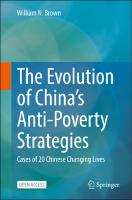The Evolution of China’s Anti-Poverty Strategies
Cases of 20 Chinese Changing Lives
Abstract
This open access book presents the findings of the author’s 3 decades of studying China’s evolving anti-poverty strategies. It argues that much of the billions that nations spend yearly on economic aid is used inefficiently or to treat the symptoms but not the root causes of poverty. China, however, has evolved an effective sustainable alternative by providing the means for self-reliance to not only relieve economic poverty but also poverty of spirit. As a result, the success of China’s historic war on poverty has been due not only to top-down visionary leadership but also to the bottom-up initiatives of an empowered populace unswervingly united in ending poverty. From 1993 to 2019, the author drove over 200,000 km around China and interviewed hundreds of people from all walks of life as he explored the evolution of China’s anti-poverty strategies from simplistic aid and redistribution, which often engendered dependency and poverty of spirit. Over time, the philosophy shifted to empowerment by fostering self-reliance—or as Chinese put it, “blood production rather than blood transfusion.” The primary method of empowerment was to provide modern infrastructure, “Roads first, then riches,” so rural dwellers in remote Inner Mongolia or the Himalayan heights of Tibet had the same access to markets, jobs and internet for e-commerce as their urban counterparts. People who seized the opportunities and prospered first then used their newfound wealth and experience to help others. The stories in this book include a Tibetan entrepreneur whose family was impoverished in spite of 300 years of service to the Panchen Lama, or the farm girl with 4 years of education who now has several international schools, a biotechnology company and poverty alleviation projects across China, or the photographer who walked 40,000 km through deserts to chronicle the threat of desertification. Their tales underscore how diverse people across China helped make possible China’s success in alleviating absolute poverty and why Chinese are now confident in achieving a “moderately prosperous society.”
Keywords
precision poverty alleviation; minority poverty in China; self-reliance and self-sufficiency; China and Sustainable Development Goals for 2030; Tibet poverty alleviation; preserve Chinese intangible cultural heritageDOI
10.1007/978-981-19-7281-2ISBN
9789811972812, 9789811972812Publisher
Springer NaturePublisher website
https://www.springernature.com/gp/products/booksPublication date and place
Singapore, 2023Imprint
Springer Nature SingaporeClassification
Asian history
Social and ethical issues
Development studies


 Download
Download Web Shop
Web Shop